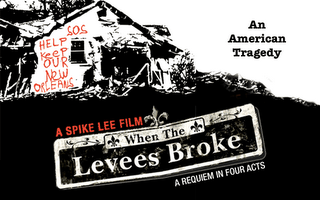
Heartbreaking.
That's my one-word review of When the Levees Broke: A Requiem in Four Acts, Spike Lee's documentary on Hurricane Katrina and its impact on New Orleans.
I caught the first half of the four-hour doc on HBO tonight. The second part airs Tuesday night and it's available for a while on HBO On Demand. It's easily the best documentary of the year (I can't imagine anything else trumping Lee's artfully assembled piece of work). But unless I'm mistaken, it doesn't qualify for Oscar consideration, because it didn't receive a theatrical release.
The images -- in particular, a sequence focused on the rescue of five children whose mother has died after all were stranded in their waterlogged home for several days; and multiple images of bloated corpses in waterways and on the pavement -- are terrible and beautiful. The latter, I mean, in terms of their ability to show viewers the awful truth about the disaster.
And the interviews, with everyone from the usual suspects to average Joes and the likes of musicians Terence Blanchard (Lee's longtime composer) and Donald Harrison, are provocative and revealing.
No, I don't believe that anyone purposely exploded the levees, and, yes, I believe that both Mayor Ray "Blamin'" Nagin and Gov. Weepy and their predecessors for several generations, deserve much of the blame for the extent of the disaster. So do multiple previous state and federal legislatures and Presidential administrations, none of whom did what needed to be done, in terms of bolstering the levees.
But after revisiting Katrina, with the help of Lee, I'm more convinced about this than ever: There is no good, logical explanation for the federal government's late and completely inadequate response to the aftermath of Katrina. Flood waters rose for DAYS AND DAYS, people were dying, daily, in attics, on rooftops, in the Superdome and on overpasses. News crews and even the Royal Canadian Mounties made their way to New Orleans, and offered help. The federal government, meanwhile, was busy making excuses, quibbling about which agency had authority over the disaster, and generally focusing its attention elsewhere.
We can jet off anywhere around the world, to come to the aid of other countries' disasters, or to demonstrate our political muscle, and we can do it in 48 hours. But we can't get aid to New Orleans, a major American city and one of the world's cultural treasures? FOR SHAME!
Those who have had a chance to see the documentary in advance have praised Lee's film:
Ariel Levy, in a profile of Lee appearing in the 8/21 issue of New York magazine: "The four hours ... fly by. It is an astonishing piece of work. The full nightmare of Katrina becomes palpable and unavoidable in a way it hasn't yet in art." (100).
John Leonard, also in New York: "When the Levees Broke: A Requiem in Four Acts, as we might expect from Spike Lee’s deciding to take on Katrina and New Orleans, is the class act of this summer’s documentaries, and the whole year, too—something between a nineteenth-century novel and anthropology with a sword, a combination of Balzac and Fats Domino. It was as if a war had been declared on the lower classes and the darker skins ... Bulldozers seemed quicker to arrive than buses, much less any of those FEMA trailers for the homeless—bulldozers because, in the devastation of an ecosystem of Creole culture, easy-money opportunists dreamed immediately of sugar-plum industrial parks ... To this masterful crosscutting mix of past and present, of authority and anguish, of ass-covering officialdom and angry dispossession, of sick-city misery and soul-stirring music, add an obscene recurrence of dead bodies left to rot on city streets" (81).
Stephen Holden, in his review in the New York Times, opens with these words:
"It isn’t the painful recapitulation of the incompetence, indifference and confusion in high places that makes Spike Lee’s epic documentary When the Levees Broke: A Requiem in Four Acts a wrenching experience. What breaks your heart is the film’s accumulated firsthand stories of New Orleans residents who lost everything in the flood after Hurricane Katrina, and the dismaying conclusion that a year after the disaster, the broken city has been largely abandoned to fend for itself."
And, later: "Although seeds of hope are woven into this tapestry of rage, sorrow and disbelief, the inability of government at almost every level to act quickly and decisively leaves you aghast at what amounts to a collective failure of will."
It's sad, compelling stuff -- IMO, the season's only must-see television event.
For links to all the major reviews of Spike's documentary, go to metacritic.




No comments:
Post a Comment